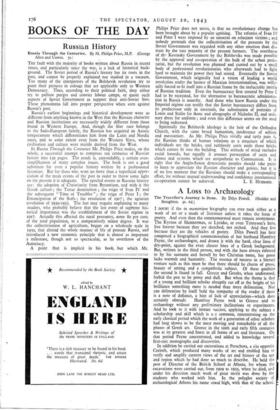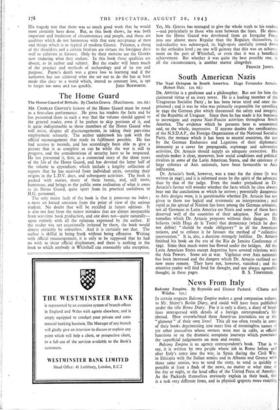A Loss to Archaeology
The Traveller's Journey is Done. By bilys Powell. (Hodder and StoUghton. gs. 6d.)
I DOUBT if the in memoriam biography can ever rank either as a work of art or a mode of literature unless it takes. the form of poetry. And even then the commemorated must remain anonymous. The Kyrnos of Mimnermus, or Lycidas, or even Tennyson's hero, live forever because they are sketched, not etched. And they live because they are the vehicles of poetry. Dilys Powell has here composed a biographical commemoration of her husband Humfrey Payne, the archaeologist, and drawn it with the hard, clear lines of dry-point, against the even clearer lines of a Greek background. But, written in the third person, and with she hero always referred to by his' surname and herself by her Christian name, her prose lacks warmth and humanity. The essence of success in a literary venture such as this must be that there should be charm of prose, beauty of setting and a sympathetic subject. Of these qualities the second is found in full. Greece and Greeks, when understood, forbid the pen to be prosy and dull. But when the theme is that of a young and brilliant scholar abruptly cut off at the height of his brilliance something more is needed than mere delineation. Nor can delineation by itself hold the sympathy of the reader if there is a note of defiance, a hint of lack of appreciation—which does certainly obtrude. Humfrey Payne took to Greece and to archaeology without any preliminary inclinations or experiments. And he took to it with instant success, applying to the subject a scholarship and skill which is n at common, concentrating on the early classical period which the work of a generation of other scholars had long shown to be the most moving and remarkable of all the phases of Greek art. Greece in the sixth and early fifth centuries was at its greatest and finest in all forms of art and literature. On that period Payne concentrated, and added to knowledge several first-rate monographs and discoveries. In addition he carried out excavations at Perachora, a site opposite Corinth, which produced many works of art and enabled him to verify and amplify current views of the art and history of the age and region which he had done so much to describe. He held the post of Director of the British School at Athens, for whom the excavations were carried out, from mg to $935, when he died, and under his direction much work of great merit was done by the students who worked with him. In the polyglot society of archaeological Athens his name stood high, with that of the school.
• His tragedy was that there was so much good work that he would most certainly have done. But, as this book shows, he was both impatient and intolerant of circumstances and people, and those are qualities which do not harmonise with that easy acceptance of men and things which is so typical of modern Greece. Patience, a shrug of th.: shoulders and a certain fatalism are virtues the foreigner does well to cultivate in Greece. Only by their exercise are the Greeks now enduring what they endure. In this book those qualities are absent, as in author and subject. But the reader will learn much of the practice and methods of archaeology and of its use and purpose. Payne's death was a grave loss to learning and if the authoress has not achieved what she set out to do she has at least made this clear to a world which, inured to constant loss, is apt
to forget too soon anti too quickly. JOHN -BOXWORTH.



























 Previous page
Previous page